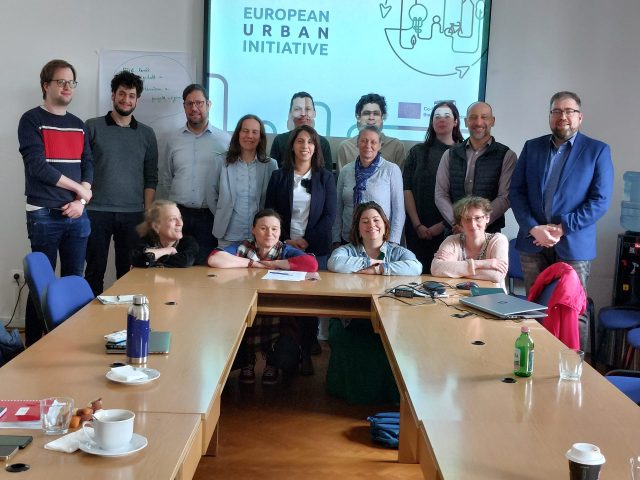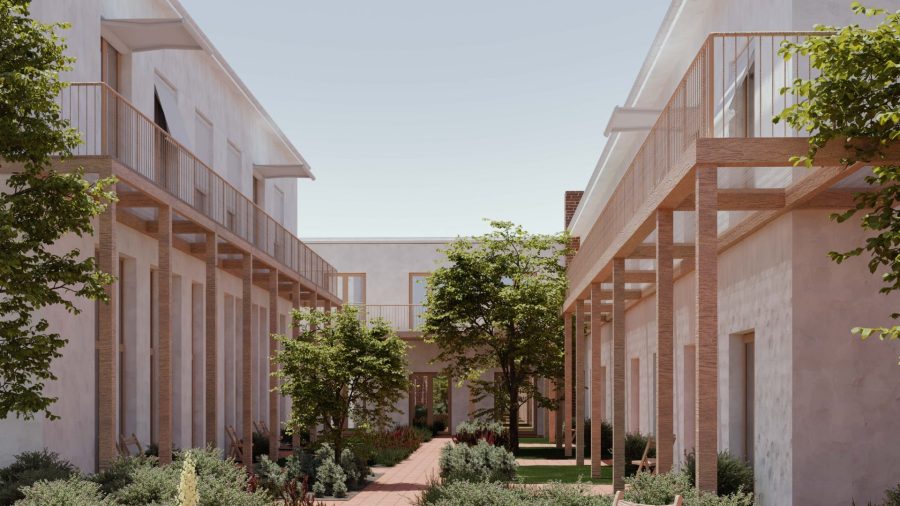Like many European cities, Budapest is facing an energy crisis, exacerbating the existing housing affordability crisis and exposing new groups to energy poverty and housing insecurity. Moreover, Budapest’s social rented housing sector has been marginalised, shrinking and in a state of disrepair for decades. To address these challenges, the Budapest Capital City has launched the new innovative action project Affordable Housing for All (AHA Budapest), supported by the European Urban Initiative (EUI), which aims to create a more attractive, flexible and inclusive rental housing system.
Two main pillars
The project is built around two main pillars: increasing the supply of affordable housing by converting a disused former school building into energy-efficient social housing in Újpest, and setting up a Housing Office to offer new solutions to support people in housing crisis. It will set up a unique Early Warning System to identify households in rent arrears and energy poverty, offer preventive social and energy interventions and expand the social housing supply with new, flexible and affordable solutions. The project will work closely with the recently established Budapest Housing Agency which will ensure that the Housing Office can support the housing of many more people by attracting vacant private housing than by relying only on the existing social rental stock. The flexible housing solutions to be developed will not only help those seeking access to affordable rental housing, but also energy-poor homeowners, who will be given the opportunity to reduce the maintenance costs of their property while retaining ownership through these innovative forms of housing.
Sustainable and participatory
The innovation of AHA Budapest lies in the development of a complex, modular integrated service model that aims to reposition social housing as a financially stable, green and aesthetic sector, making it attractive to private investors, making it scalable and financially sustainable. The AHA Budapest consortium and their collaborating partners include a wide range of stakeholders, including knowledge institutions, professional NGOs and private organisations (real estate companies, banks, etc.), in order to develop progressive housing measures based on the PPPP approach. Participation is an important element of the project: the development of social housing in Újpest emphasises the involvement and participation of tenants and the neighbourhood, which strengthens the sense of belonging of the residents, while contributing to better sustainability of the sector and greater inclusion of vulnerable people.
European
The main aim of the European Urban Initiative (EUI) is to test innovative solutions in European cities that will help transform urban areas across the EU. To this end, the AHA is already involving three transfer cities in the main project – Pula in Croatia, Breda in the Netherlands and Alfafar municipality in Spain. This will ensure that the positive results of the project will be transferred to these cities, so that the good practices identified in the AHA will benefit people in need of housing across Europe. This is key because projects like the AHA not only deliver results for local residents, but also create innovative solutions at a larger scale to address our common problems.

The role of MEHI
After 2022, the housing crisis deepened as energy costs rose. Therefore, the Hungarian Energy Efficiency Institute and its RenoPont Energy Home Renovation Centre have a key role to play in the project, making energy interventions and advice an essential part of its support services. MEHI also plays an important role in the development of the Early Warning System: it is responsible for identifying and reaching energy poor people, for raising the energy efficiency awareness of tenants and owners and for developing the energy part of the new support schemes.
Partners
In addition to the Municipality of Budapest, the partnership also includes an NGO dealing with housing poverty (Street to Housing Association), a social and urban development research company (Metropolitan Research Institute), an architectural firm that designed the apartment building in Újpest (NART Architects), an IT firm that developed the early warning system (PopCode), an international consultancy firm responsible for the long-term sustainability of the project (BURST), a professional architectural institution responsible for community design (Contemporary Architecture Centre) and a non-profit organisation which promotes the major events in Budapest and in project coordinates communication (Budapest Brand).
The entire partnership attended the project launch meeting, which took place at the Municipality of Budapest on 21-22 March 2024.
The AHA can help to solve Budapest’s housing crisis in the short term, and in the long term it can be a significant step towards solving Europe’s housing problem.
For a brief description of the project and basic data: https://www.urban-initiative.eu/ia-cities/budapest/home



